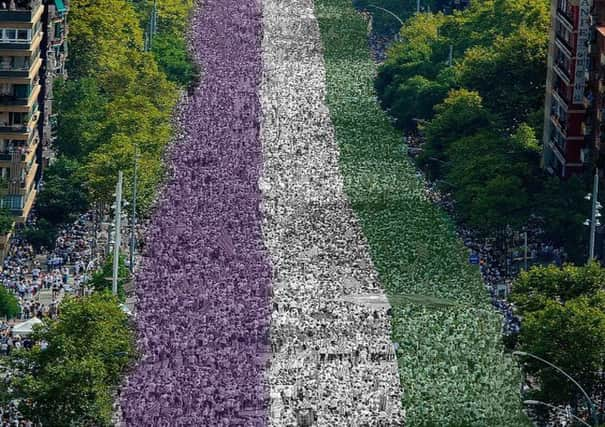Susan Dalgety: Does Sturgeon have Suffragettes' courage?


The Processions project is billed as a “mass participation artwork”, but don’t let that put you off joining in.
Women getting the vote was a huge step forward towards a balanced society, one where women and men enjoy equal rights.
Advertisement
Hide AdAdvertisement
Hide AdIt is a piece of history well worth celebrating, even if you have to pretend to be a piece of art for the afternoon.
But don’t be fooled into thinking that we have achieved equality.
Women may be allowed to vote, but when it comes to political power, we are still lagging far behind the boys.
“We have a female First Minister,” I hear you cry.
“And Theresa May is a woman,” shouts someone.
“What about that Ruth Davidson?” says some bloke at the back.
Advertisement
Hide AdAdvertisement
Hide AdIt is true that there are a handful of woman in very senior positions, but a quick glance at our council chambers – the place where the decisions that affect our daily lives are taken – tells a different story.
Less than a third – only 29 per cent - of Scotland’s councillors are women. Not one of the 32 councils has 50-50 men and women councillors.
Edinburgh is one of the better ones with 24 women councillors (38 per cent).
East Lothian has only six out of a possible 28, while Midlothian, once infamous as a male bastion tops the national poll. Seven of its 18-strong group are women (38.9 per cent), just beating Edinburgh into second place as the most female council in Scotland.
Advertisement
Hide AdAdvertisement
Hide AdDoes the sex of a councillor really matter? Surely it is the quality of the decisions they make that matters, not their gender.
Well, speaking as a former councillor, I think it does. Very much.
Local councils have responsibility for our childrens’ schools. They oversee social care and social work. They make sure our streets are clean, dispose of our household rubbish, keep our roads safe, and plan the future shape of our cities and towns.
The backbenchers at Westminster and Holyrood may make a lot of noise, but it is their council colleagues who have real power.
Advertisement
Hide AdAdvertisement
Hide AdAnd in 2018, those councillors should look like the communities they represent – and that means at least half should be women.
Campaigning organisations like Women 5050 and the Electoral Reform Society do a great job trying to persuade political parties that they should select more women to stand for election.
But I believe the time for persuasion is over.
Just as there had to be a change in the law to give women the vote, there should be legislation to ensure that there is balanced representation on our councils, and in our parliaments.
In 2016, Ireland joined a group of over 100 countries that use mandatory electoral quotas. The roof didn’t fall in the Dail, their parliament. But there was a 40 per cent increase in the number of women MPs.
Advertisement
Hide AdAdvertisement
Hide AdThe Scottish Government, led by a woman, and with a gender-balanced cabinet, is currently considering electoral reform.
“Now is a good time to think about the kind of innovation people in Scotland would like to see in elections,” says the government’s website.
The most significant change that Nicola Sturgeon could bring about is to have far more women building our communities as councillors.
Introducing gender quotas in Scotland’s council chambers would be a really radical thing for her to do.
Advertisement
Hide AdAdvertisement
Hide AdBut it would take courage to ignore the shouts of “foul” and “unfair” that would inevitably come from blokes across all political parties – the kind of courage that the Suffragettes in their green, purple and white, showed when they campaigned for votes for women.
Does Nicola Sturgeon have it in her? I sincerely hope so.
